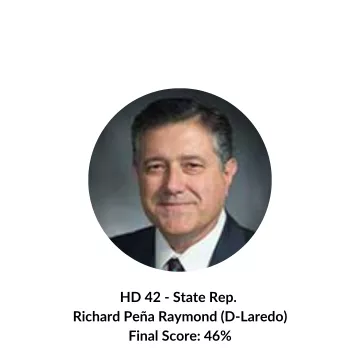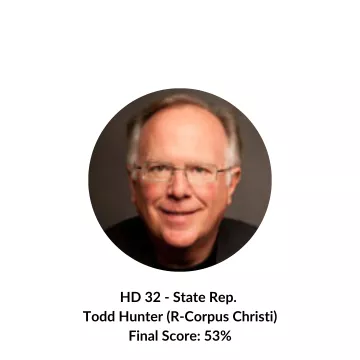All Democrats are not the same

There have been too many bad bills that too many Democrats voted for to support the perception that all Democrats are pro environment, clean air, local control, and clean water. It was truly disheartening to see so many of them vote for such an obvious polluter giveaway bill as HB 5. While some voted against and should be applauded, 47 Democrats voted in favor of it… and for what? A promise to get their bill heard in committee? If that was the case for some of them, as has been rumored, this is precisely how special interest divide and conquer tactics work - pitting one progressive effort against another. A similar example was HB 2127, sometimes referred to as the “Death Star Bill,” which stripped away the rights of local government to pass ordinances and policies on a number of issues, including worker safety and certain natural resource protections, where many Democrats - including Rep. Richard Peña Raymond (who also voted for HB 5) - ended up supporting it “to create a level playing field” for business interests. It would be interesting to see any of these politicians - Republicans or Democrats – work construction or landscaping without getting a water break in extreme heat.
All Republicans are not the same

What the GOP is doing to our democracy and our state is historically heinous. Let’s not equivocate here. They were pretty unified on some oppressive bills (attacking trans youth, suffocating local democracies, censorship, taking over the Houston ISD, etc.). But they are not unified on every issue. HB 5, for example, which resuscitates the school property tax abatement subsidy for corporate polluters (Chapter 313) and makes it even more of a giveaway with our money, had a sliver of Republicans opposing it based on their opposition to government subsidies.
Another example: Rep. Todd Hunter. While he sponsored several bills we actively opposed (see HB 5 above), we do credit him for his position on energy efficiency, demand response, and renewable energy, as solutions to mitigating rising costs and reliability. He used his power to amend the demand response bill SB 114 onto another bill, which should not be overlooked, while also keeping the worst anti-renewable bills and measures from moving forward in the House. He also did not allow SB 6, which would have been an $18 billion ratepayer subsidy to Berkshire Hathaway types, out of the House State Affairs Committee he chairs.

Photo by Al Braden
Let’s talk about SB 7
It was awkward, to say the least, to be listed next to corporate polluting special interests in favor of SB 7, so let’s set the record straight. The Sierra Club has been critical of the so-called performance credit mechanism (PCM for short) - a policy approved by the Public Utility Commission (PUC) in January - all along because it is a risky and expensive idea that puts more of your hard-earned money into the coffers of polluting power generation companies in exchange for an untested promise that fossil fuels won’t fail us again (as they have almost every time the grid is in danger). The main reason why we supported SB 7 was because it put some “guardrails” on the concept to protect Texas families from paying through the nose, and also made sure that the PCM would only be implemented if some other more cost-effective ideas were implemented first.
Still, despite our support for SB 7 (and other bills that included the PCM concept like the PUC Sunset bill, HB 1500), the better way to protect our pocket books and de-stress the electric grid is to invest in energy efficiency, but the House State Affairs Committee failed to vote on SB 258. We believe Sen. Eckhardt’s SB 258 would have been supported by most, if not all, Democrats, and a sizable number of Republicans (see below). Nevertheless, while SB 7 got through the House, some Democrats (Turner, Anchia, Morales Shaw, and others) pushed to raise or eliminate the cost cap that we were supporting. Why would they do that? Look at the energy special interests in their districts (eg., Vistra). We have a long way to go before the environmental justice movement achieves a solid and unwavering voting bloc.

Photo by Al Braden
Historic progress on moving an energy efficiency bill, but utilities still opposed
Three sessions ago, the bill that would increase our state’s goal for energy efficiency did not get a committee hearing. In 2021, the bill was heard but did not make it out of committee. This session, it was not only voted out of committee, it passed the conservative Senate on a bipartisan 18-13 vote. That’s progress.
However, unlike last session when they successfully avoided most public scrutiny, electric utilities (specifically transmission and distribution utilities like Oncor, CenterPoint, and AEP Texas), testified in opposition to SB 258, which would have raised the energy efficiency goal for Texas for the first time in 12 years. Their excuse for opposing the bill was ironic but not surprising. Claiming it would be too costly and aggressive was, frankly, laughable in the midst of bills that will cost the same Texans billions of dollars every year and not guarantee reliability and their support for other measures that cost Texans far more. Energy efficiency would lower bills for electric customers and bolster reliability by lowering demand, but no matter how loud we said it, the special interest power of these utilities was still too great to overcome.
For now, they win another round but we are committed to pushing for solutions that help Texas families take control of their rising electric bills. See you at the PUC!

Photo by Al Braden
A long way to go for water
When thinking about water this session it would be impossible to avoid SB 28 and SJR 75. This bill and resolution will create the Texas Water Fund and New Water Supply for Texas Fund, to be funded with a combined $1 billion, pending voter approval on the constitutional amendment in November 2023. The final version of SB 28 contains a great deal of good: from addressing municipal water loss in a meaningful way to ensuring that the Texas Water Development Board (TWDB) can effectively use its dollars to help utilities that are struggling with aging infrastructure. Unfortunately, the bill also contains potential funding for risky and unproven projects like widespread marine desalination or fracking wastewater (produced water) treatment. And when an opportunity to expand the bill’s priority areas to include Texas’s most vulnerable communities came up as an amendment, it was swiftly removed by Sen. Charles Perry.
Organizations that work on Texas water issues were overwhelmingly supportive of SB 28 as it aims to solve water supply concerns, but the larger moment also reveals a concerning issue of equity in our state. Bills that aimed to increase support to Texas’s economically distressed areas, predominantly communities of color, hit a roadblock in the Senate Committee on Water, Agriculture, and Rural Affairs, where Sen. Perry is the Chair.
And for all of the discussion of water supply and potential conservation measures, protecting our communities and wildlife from water quality concerns seems to be at the very back of the legislature’s mind. At some point, our state will have to deal with water quality concerns from the increasing frequency of climate change-induced drought and flooding. But there’s also a clear need to address the pollutants and industries that are causing harm now. In a year when both the Texas Water Development Board and the Texas Commission on Environmental Quality were going through a sunset process — including legislation to continue those agencies through 2036 — the legislature on the whole chose to ignore water quality issues as part of that review process and legislation. Whether it’s addressing concerns of excess brine pollution to our bays and estuaries, or addressing pre-production plastic pollution like nurdles that wreak environmental havoc and carry human health risks, the legislature as a whole seems to take an “ignorance is bliss” approach. This comes despite the fact that there’s clear evidence of changes to our communities and ecosystems stemming from this pollution.
Next Section: Key Senate Votes